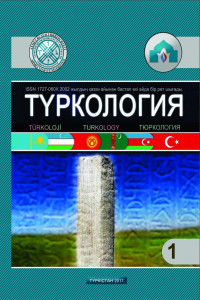ÂŞIK EDEBİYATINDA MUHANNET TİPİ
Âşık şiiri geleneksel bir yapıya sahiptir ve toplumla iç içedir. Bu yüzden toplumun sözcüsü olan âşıkların şiirlerinden hareketle o toplumda yaşayan bireylerin davranışlarına ve çeşitli özelliklere dair çıkarımlarda bulunmak mümkündür. Bireyleri anlattıkları şiirlerde yiğit, mert gibi olumlu veya namert, muhannet gibi olumsuz insan tiplerini mevzu etmişlerdir. Bu çalışmada 16. yüzyıldan günümüze âşıkların şiirleri incelenerek muhannet tipin özellikleri ortaya konmuş ve âşıkların muhannet insanı nasıl betimledikleri üzerinde durulmuştur. Kimi zaman bazı dörtlüklerde anlatılan bu insan tipi kimi zaman bir şiirin başlı başına konusunu oluşturmuştur. Muhannet kavramı gelenek içinde âşıkların şiirlerinde bir kalıp olarak ifade edilmiş ve kelimenin anlamına uygun olarak kullanılmıştır. Âşık şiirinde daha çok insanlara yardım etmeyen, dünya malı peşinde koşan, insanları kendisine minnet ettiren ve bundan zevk alan, cimri, misafirperver olmayan, sofrasını kimseye açmayan, zorda kalınca kaçan, yiğitlerin yaşamasını istemeyen, sevgi yoluna layık olmayan, çoğu insana zararı dokunan, sözleriyle insanları inciten, sözünde durmayan ve kibirli bir tip olarak betimlenmiştir. Âşıkların taşlama türü şiirlerinde gördüğümüz bu örnekler Türk toplumunun hayat felsefesiyle de paralellik göstermektedir.
MUHANNET TYPE IN MINSTREL LITERATURE
Minstrel poetry has a traditional structure and is intertwined with society. Therefore, it is possible to make inferences about the behaviour and various characteristics of the individuals living in that society through the poems of the minstrels who are the spokespeople of the society. In their poetry, they have dealt with positive human types such as valiant, brave or negative people such as vile and muhannet. In this study, the poems of the minstrels from the 16th century to the present have been examined, the characteristics of the muhannet type and how the minstrels have depicted the muhannet person have been revealed. This type of human was described in some verses at times and sometimes constituted the subject of a poem. The concept of muhannet is expressed as a pattern in the poems of minstrels in the tradition and used in accordance with the meaning of the word. In minstrel poetry, the insecure type was described, in general as someone who does not help more people, pursues world goods, makes people grateful and enjoys it, does not have guests, does not open its table to anyone, escapes when he is in trouble, does not want the valiant to live, is not worthy of the way of love, is harmful to many people, hurts people, does not keep its word and sees itself higher than other people. These examples, which we see in the poems of the minstrel’s grinding, are in parallel with the life philosophy of the Turkish society.
